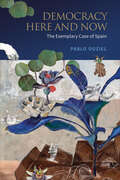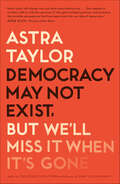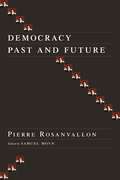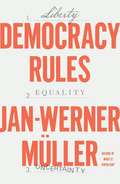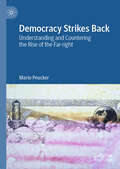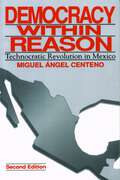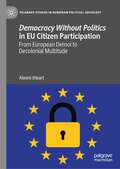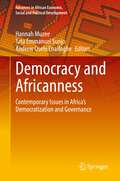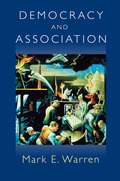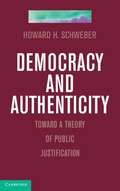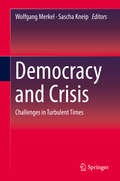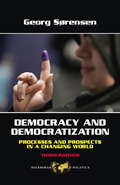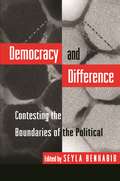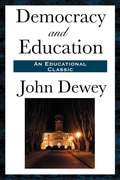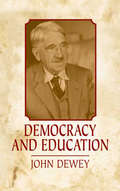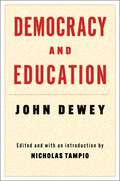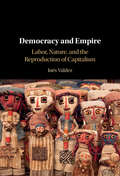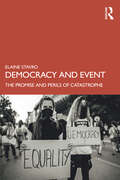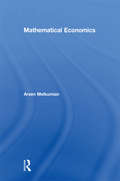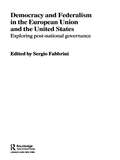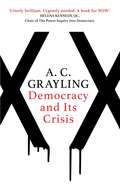- Table View
- List View
Democracy Disfigured
by Nadia UrbinatiIn "Democracy Disfigured, "Nadia Urbinati diagnoses the ills that beset the body politic in an age of hyper-partisanship and media monopolies and offers a spirited defense of the messy compromises and contentious outcomes that define democracy. Urbinati identifies three types of democratic disfiguration: the unpolitical, the populist, and the plebiscitarian. Each undermines a crucial division that a well-functioning democracy must preserve: the wall separating the free forum of public opinion from the governmental institutions that enact the will of the people. Unpolitical democracy delegitimizes political opinion in favor of expertise. Populist democracy radically polarizes the public forum in which opinion is debated. And plebiscitary democracy overvalues the aesthetic and nonrational aspects of opinion. For Urbinati, democracy entails a permanent struggle to make visible the issues that citizens deem central to their lives. Opinion is thus a form of action as important as the mechanisms that organize votes and mobilize decisions. Urbinati focuses less on the overt enemies of democracy than on those who pose as its friends: technocrats wedded to procedure, demagogues who make glib appeals to "the people," and media operatives who, given their preference, would turn governance into a spectator sport and citizens into fans of opposing teams.
Democracy Here and Now: The Exemplary Case of Spain
by Pablo OuzielIn Spain, on 15 May 15, 2011, a movement against austerity measures began. In a time when representative democracies were under threat, 15M came to life as a virtuous and democratic response to the slide into far-right populism and authoritarianism. More than a social movement, 15M became a mode of being with transformative, democratizing potential. In Democracy Here and Now, Pablo Ouziel offers a grounded analysis of 15M. At the time of the movement and during the ensuing encampments, Ouziel travelled extensively, speaking to participants, and keeping an ongoing record of his conversations. Presenting an original participatory mode of research, the book reveals six types of intersubjective, "joining hands" relationships that 15M has brought into being and works to carry on in creative ways. The book shows how the movement’s way of being and temporality persists in Spain following the square occupations, while 15M citizens continue to learn and move forward in less perceptible ways. Democracy Here and Now sheds light on a deeply relational, intersectional, and eco-social mode of democracy, and shows how 15M’s ongoing democratization practices are exemplary of similar grassroots movements around the world, broadening our understandings of what it means to be democratic in the here and now.
Democracy May Not Exist, But We'll Miss It When It's Gone
by Astra Taylor“A New Civil Rights Leader” explores what we mean when we speak of democracy and if democracy can truly ever exist (LA Times).There is no shortage of democracy, at least in name, and yet it is in crisis everywhere we look. From a cabal of plutocrats in the White House to gerrymandering and dark-money campaign contributions, it is clear that the principle of government by and for the people is not living up to its promise.The problems lie deeper than any one election cycle. As Astra Taylor demonstrates, real democracy—fully inclusive and completely egalitarian—has in fact never existed. In a tone that is both philosophical and anecdotal, weaving together history, theory, the stories of individuals, and interviews with such leading thinkers as Cornel West and Wendy Brown, Taylor invites us to reexamine the term. Is democracy a means or an end, a process or a set of desired outcomes? What if those outcomes, whatever they may be—peace, prosperity, equality, liberty, an engaged citizenry—can be achieved by non-democratic means? In what areas of life should democratic principles apply? If democracy means rule by the people, what does it mean to rule and who counts as the people?Democracy’s inherent paradoxes often go unnamed and unrecognized. Exploring such questions, Democracy May Not Exist offers a better understanding of what is possible, what we want, why democracy is so hard to realize, and why it is worth striving for.“Astra Taylor will change how you think about democracy. . . . She unpacks it, wrestles with it, with the question of who gets included and how, and excavates the invisible assumptions that have been bred into our idea of democracy.” —Ezra Klein, The Ezra Klein Show“An impressive contribution. . . . Taylor sets out to impart some coherence and substance to the term in order to rescue it from ignorance and obfuscation and displays considerable intellectual nimbleness.” —Randall Kennedy, The New York Times Book Review“Magnificent, paradigm-shifting . . . Taylor’s deep and wide examination of democratic movements, conversations, and grassroots institutions makes the reader feel . . . democracy as pleasure of thinking and acting.” —The Los Angeles Review of Books
Democracy Past and Future
by Samuel MoynOne of Europe's leading contemporary political thinkers proposes provocative new readings of the history, aims, scope, and possibility of democratic theory and practice today.
Democracy Past and Future (Political Thought / Political History)
by Pierre RosanvallonDemocracy Past and Future is the first English-language collection of Pierre Rosanvallon's most important essays on the historical origins, contemporary difficulties, and future prospects of democratic life.One of Europe's leading political thinkers, Rosanvallon proposes in these essays new readings of the history, aims, and possibilities of democratic theory and practice, and provides unique theoretical understandings of key moments in democracy's trajectory, from the French Revolution and the struggles for universal suffrage to European unification and the crises of the present. In so doing, he lays out an influential new theory of how to write the history of politics. Rosanvallon's historical and philosophical approach examines the "pathologies" that have curtailed democracy's potential and challenges the antitotalitarian liberalism that has dominated recent political thought. All in all, he adroitly combines historical and theoretical analysis with an insistence on the need for a new form of democracy. Above all, he asks what democracy means when the people rule but are nowhere to be found.Throughout his career, Rosanvallon has resisted simple categorization. Rosanvallon was originally known as a primary theorist of the "second left", which hoped to stake out a non-Marxist progressive alternative to the irresistible appeal of revolutionary politics. In fact, Rosanvallon revived the theory of "civil society" even before its usage by East European dissidents made it globally popular as a non-statist politics of freedom and pluralism. His ideas have been shaped by a variety of influences, ranging from his work with an influential French union to his teachers François Furet and Claude Lefort.Well known throughout Europe as a historian, political theorist, social critic, and public intellectual, Pierre Rosanvallon was recently elected to a professorship at the Collège de France, Paris, a position held at various times by Claude Lévi-Strauss, Michel Foucault, and Pierre Bourdieu. Democracy Past and Future begins with Rosanvallon's groundbreaking and synthetic lecture that he delivered upon joining this institution. Throughout the volume, Rosanvallon illuminates and invigorates contemporary political and democratic thought.
Democracy Rules
by Jan-Werner MüllerA much-anticipated guide to saving democracy, from one of our most essential political thinkers.Everyone knows that democracy is in trouble, but do we know what democracy actually is? Jan-Werner Müller, author of the widely translated and acclaimed What Is Populism?, takes us back to basics in Democracy Rules. In this short, elegant volume, he explains how democracy is founded not just on liberty and equality, but also on uncertainty. The latter will sound unattractive at a time when the pandemic has created unbearable uncertainty for so many. But it is crucial for ensuring democracy’s dynamic and creative character, which remains one of its signal advantages over authoritarian alternatives that seek to render politics (and individual citizens) completely predictable. Müller shows that we need to re-invigorate the intermediary institutions that have been deemed essential for democracy’s success ever since the nineteenth century: political parties and free media. Contrary to conventional wisdom, these are not spent forces in a supposed age of post-party populist leadership and post-truth. Müller suggests concretely how democracy’s critical infrastructure of intermediary institutions could be renovated, re-empowering citizens while also preserving a place for professionals such as journalists and judges. These institutions are also indispensable for negotiating a democratic social contract that reverses the secession of plutocrats and the poorest from a common political world.
Democracy Strikes Back: Understanding and Countering the Rise of the Far-right
by Mario PeuckerThis book draws on empirical research from North America, Europe and Australia to present a nuanced picture of the far right and analyses micro and macro level factors contributing to the appeal of far-right groups and agendas. It argues that a key reason for the unsatisfying progress in the struggle against the far right lies in the popular misconception that the far right operates primarily on the margins of society and the failure to acknowledge the close historical and contemporary links between far-right ideologies and the societal centre. Against this backdrop, the book develops a holistic, comprehensive agenda – outside the common Preventing and Countering Violent Extremism (P/CVE) frameworks – to reduce the appeal of the far right. This agenda addresses individual, community and structural factors to reduce susceptibility to the lure of the far right by strengthening commitment to democratic values, active citizenship, and community connectedness.
Democracy Within Reason: Technocratic Revolution in Mexico
by Miguel Angel CentenoDuring the 1980s the Mexican regime faced a series of economic, social, and political disasters that led many to question its survival. Yet by 1992 the economy was again growing, with inflation under control and the confidence of international investors restored. Mexico was now touted as an example for regimes in Eastern Europe to emulate.How did Carlos Salinas and his team of technocrats manage to gain political power sufficient to impose their economic model? How did they sustain their revolution from above despite the hardships these changes brought for many Mexicans? How did they stage their remarkable political comeback and create their “democracy within reason”? Why did Salinas succeed in keeping control of his revolution while Mikhail Gorbachev failed to do so in his similar effort at radical reform?Miguel Centeno addresses these questions by analyzing three critical developments in the Mexican state: the centralization of power within the bureaucracy; the rise of a new generation of technocrats and their use of a complex system of political networks; and the dominance of a neoliberal ideology and technocratic vision that guided policy decisions and limited democratic participation. In his conclusion the author proposes some alternative scenarios for Mexico’s future, including the role of NAFTA, and suggests lessons for the study of regimes undertaking similar transitions.Of obvious interest to students of contemporary Mexico and Latin America, the book will also be very useful for those analyzing the transition to the market in other countries, the role of knowledge in public policy, and the nature of the modern state in general.
Democracy Without Politics in EU Citizen Participation: From European Demoi to Decolonial Multitude (Palgrave Studies in European Political Sociology)
by Alvaro OleartHow does the dominant understanding(s) of the demo(i)cratic subject in the EU, and of democracy more broadly, shape the EU’s democratic innovations on ‘citizen participation’? What are the politically and normatively preferable alternatives, both in terms of the conceptualisation of the democratic subject in the EU and in the ensuing political practices? The book addresses these questions combining a political theory with a political sociology perspective, contrasting the ‘democracy without politics’ approach of the EU in the context of the Conference on the Future of Europe with that of ongoing transnational activist processes. In doing so, it develops an agonistic alternative to ‘the people(s)’ as the political imaginary of democracy in the EU, which is based on the idea of the ‘decolonial multitude’. Thus, the book puts forward a diagnosis of current debates on EU democratic legitimacy as well as proposing an alternative.
Democracy and Africanness: Contemporary Issues in Africa’s Democratization and Governance (Advances in African Economic, Social and Political Development)
by Hannah Muzee Tata E. Sunjo Andrew EnaifogheThis book examines the governance and democratization process in Africa, its history, trends, and prospects. Written by a diverse panel of experts, the book provides an intersectional and interdisciplinary analysis of Africa’s democratic environment. Chapters cover topics such as the evolution of democracy in Africa, electoral politics, gender, activism, human rights, and cultural diversity. Critically assessing the fit of democracy for African countries and offering strategies for the Africanization of democracy, this volume will be important for researchers and students interested in African politics, postcolonial theory, democracy, and governance.
Democracy and Association
by Mark E. WarrenTocqueville's view that a virtuous and viable democracy depends on robust associational life has become a cornerstone of contemporary democratic theory. Democratic theorists generally agree that issue networks, recreational associations, support circles, religious groups, unions, advocacy groups, and myriad other kinds of associations enhance democracy by cultivating citizenship, promoting public deliberation, providing voice and representation, and enabling varied forms of governance. Yet there has been little work to show how and why different kinds of association have different effects on democracy--many supportive but others minimal or even destructive.This book offers the first systematic assessment of what associations do and don't do for democracy. Mark Warren explains how and when associational life expands the domain, inclusiveness, and authenticity of democracy. He looks at which associations are most likely to foster individuals' capacities for democratic citizenship, provoke political debate, open existing institutions, guide market activities, or bring democratic decision-making to new venues. Throughout, Warren also considers the trade-offs involved, noting, for example, that organizational solidarity can dampen internal dissent and deliberation even as it enhances public deliberation. Blending political and social theory with an eye to social science, Democracy and Association will draw social scientists with interests in democracy, political philosophers, students of public policy, as well as the many activists who fortify the varied landscape we call civil society. As an original analysis of which associational soils yield vigorous democracies, the book will have a major impact on democratic theory and empirical research.
Democracy and Authenticity
by Howard H. SchweberIn Democracy and Authenticity Professor Howard Schweber examines a basic problem for liberal democracies. When a political entity is characterized by a multitude of identities and values, certain constraints apply to reasons for citizens and public officials to justify coercive political actions. The author argues that justifications based on particular religious doctrines are not a proper basis for government actions that affect everyone. He then develops a concept of public justification intended to guide citizens in a liberal democracy through the work of creating policies that satisfy their responsibilities to one another.
Democracy and Crisis: Challenges In Turbulent Times
by Wolfgang Merkel Sascha KneipIn light of the public and scholarly debates on the challenges and problems of established democracies, such as a lack of participation, declining confidence in political elites, and the deteriorating capabilities of democratic institutions, this volume discusses the question whether democracy as such is in crisis. On the basis of the shared concept of embedded democracy, it develops a range of conceptual approaches to empirically analyzing the challenges of democracy and their potential transformation into crisis phenomena. The book is divided into three parts, the first of which highlights various aspects of political participation, such as political inequality in voting. In turn, Part II focuses on problems of political representation, while Part III assesses whether processes such as globalization, deregulation, and the withdrawal of the state from important policy areas have limited the political control and legitimacy of democratically elected governments.
Democracy and Democratization
by Georg SorensenWhat is democracy? What are the pitfalls and the positive potentials in the growing trend toward democratization? This book examines the prospects for democracy in the world today and frames the central dilemma confronting all states touched by the process of democratization. Georg Sørensen clarifies the concept of democracy, shows its application in different contexts, and questions whether democratic advancement will continue-and if so, at what price. The consequences of democracy for economic development, human rights, and peaceful relations among countries are illuminated in both their positive and negative aspects. This third edition includes an entirely new chapter on the promotion of democracy from the outside which covers current issues of state building in Iraq. Further revisions include updates to the section on the prospects of democracy in today’s world, an extended discussion of the economic performance of recently democratized countries, and an evaluation of the possibilities for further democratic consolidation. There are also new case studies, examples, and anecdotes to illustrate historical as well as contemporary instances of democratic transition. Democracy, as Sørensen convincingly portrays it, is a value in itself as well as a potential promoter of peace, prosperity, and human well-being. But democracy is not inevitable, and actions at every level-from the individual to the international-are necessary to ensure that frail or #147;frozen” democracies do not flounder and that established democracies flourish.
Democracy and Democratization
by Georg SorensenWhat is democracy? What are the pitfalls and the positive potentials in the growing trend toward democratization? This book examines the prospects for democracy in the world today and frames the central dilemma confronting all states touched by the process of democratization. Georg Sørensen clarifies the concept of democracy, shows its application in different contexts, and questions whether democratic advancement will continue-and if so, at what price. The consequences of democracy for economic development, human rights, and peaceful relations among countries are illuminated in both their positive and negative aspects. This third edition includes an entirely new chapter on the promotion of democracy from the outside which covers current issues of state building in Iraq. Further revisions include updates to the section on the prospects of democracy in today's world, an extended discussion of the economic performance of recently democratized countries, and an evaluation of the possibilities for further democratic consolidation. There are also new case studies, examples, and anecdotes to illustrate historical as well as contemporary instances of democratic transition. Democracy, as Sørensen convincingly portrays it, is a value in itself as well as a potential promoter of peace, prosperity, and human well-being. But democracy is not inevitable, and actions at every level-from the individual to the international-are necessary to ensure that frail or "frozen" democracies do not flounder and that established democracies flourish.
Democracy and Difference: Contesting the Boundaries of the Political
by Seyla BenhabibThe global trend toward democratization of the last two decades has been accompanied by the resurgence of various politics of "identity/difference." From nationalist and ethnic revivals in the countries of east and central Europe to the former Soviet Union, to the politics of cultural separatism in Canada, and to social movement politics in liberal western-democracies, the negotiation of identity/difference has become a challenge to democracies everywhere. This volume brings together a group of distinguished thinkers who rearticulate and reconsider the foundations of democratic theory and practice in the light of the politics of identity/difference. In Part One Jürgen Habermas, Sheldon S. Wolin, Jane Mansbridge, Seyla Benhabib, Joshua Cohen, and Iris Marion Young write on democratic theory. Part Two--on equality, difference, and public representation--contains essays by Anne Phillips, Will Kymlicka, Carol C. Gould, Jean L. Cohen, and Nancy Fraser; and Part Three--on culture, identity, and democracy--by Chantal Mouffe, Bonnie Honig, Fred Dallmayr, Joan B. Landes, and Carlos A. Forment. In the last section Richard Rorty, Robert A. Dahl, Amy Gutmann, and Benjamin R. Barber write on whether democracy needs philosophical foundations.
Democracy and Education
by John DeweyJohn Dewey's "Democracy and Education" addresses the challenge of providing quality public education in a democratic society. In this classic work Dewey calls for the complete renewal of public education, arguing for the fusion of vocational and contemplative studies in education and for the necessity of universal education for the advancement of self and society. First published in 1916, "Democracy and Education" is regarded as the seminal work on public education by one of the most important scholars of the century.
Democracy and Education
by John DeweyPsychology, epistemology, ethics, and politics are among the subjects on which John Dewey focused his authorial talents — but the crux of his works lies in his philosophy of education. Democracy and Education, originally published in 1916, is his landmark work in the field and an ongoing source of influence and inspiration.Dewey blends his philosophical pragmatism and his progressive pedagogical ideas to define the social role of education and its significance as preparation for citizenship in a progressive democratic society. He stresses democracy's associational and communal aspects, maintaining that conscious, directed education is necessary to establish these conditions and to cultivate democratic character in students. Growth, experience, and activity are the factors Dewey employs to characterize the connection between learning and the variety of social, communicative activity that fosters a thriving democratic community.As a conclusion, the author addresses the social barriers that inhibit democratic education. These divisions, he finds, derive from the practice of dichotomizing relationships between the mind and body, the mind and nature, and the individual and society. Dewey promotes a philosophy of education that negates these dualisms and focuses on freedom of the mind through directed social activity.
Democracy and Education: An Introduction To The Philosophy Of Education
by John DeweyThe American philosopher John Dewey transformed how people around the world view the purposes of schooling. In Democracy and Education (1916), Dewey opposed the model of education in which adults lecture at students and students follow strict rules. Instead, Dewey called upon schools to provide children with experiences such as gardening, sewing, building structures, conducting experiments in laboratories, and performing in school plays. For Dewey, democratic education teaches young people to become creative individuals who contribute to society.This edition makes Democracy and Education come alive for a new generation of readers. The editor’s introduction explores the main themes of the book and how Dewey’s ideas contribute to debates about education standards, testing, accountability, school choice, free school lunch, recess, student discipline, and education technology. Each chapter begins with a brief overview clarifying the argument and its present-day relevance and ends with questions to prompt conversations and research papers. Drawing on more than a century of secondary literature on Dewey’s philosophy, this new edition will become the standard for scholars, teachers, and students.
Democracy and Empire: Labor, Nature, and the Reproduction of Capitalism
by Inés ValdezDemocracy and Empire theorizes the material basis of popular sovereignty via the Black radical tradition. Popular sovereignty contains an affective attachment to wealth, secured through collective agreements to dominate others, i.e., self-and-other-determination. Inés Valdez expands on racial capitalism by theorizing its Anglo-European-based popular politics, which authorize capital accumulation enabled by empire and legitimated by racial ideologies. This stunts political projects in the Global South. Valdez masterfully outlines how social reproduction is provided by racialized others who sacrifice families and communities, and how the political alienation from nature in wealthy polities is mediated by technology and enabled by a joint devaluation of nature and manual labor performed by racialized others. The book concludes with a theorization of anti-imperial popular sovereignty based on political relations that encompass nature. This title is part of the Flip it Open Programme and may also be available Open Access. Check our website Cambridge Core for details.
Democracy and Event: The Promise and Perils of Catastrophe
by Elaine StavroCatastrophes unsettle our safe places within the world. As such, they provide an interesting site to analyze the intersection of our affective and political lives. Bringing radical democratic thinking, affect theory, psychoanalysis, and discursive analysis to bear on contemporary catastrophic events, Democracy and Event presents a fresh perspective on the study of affect and its impact on democratic sensibilities and practices. Situated in different countries with differing institutional histories and cultures – the Grenfell Tower fire in London, England (2017); the SARS epidemic in Toronto, Canada (2003); the Parkland shooting in Florida (2018); the early days of the COVID-19 crisis and the murder of George Floyd in Minneapolis, USA (2020) – Elaine Stavro interprets the rhetoric, discourse, and affective communication of politicians and passionate protestors. She examines their linkages to well-established organizations informed by democratic ideals, as well as the context in which they arise, which have a bearing on their ability to challenge neoliberal and authoritarian practices. Inspired by the urgent need to bring theory back to politics and politics back to theory, Elaine Stavro demonstrates how theory might inform our attitudes to contemporary events while recognizing that political action and events cannot be captured in their complexity by theory. Her skillful engagement with various theoretical approaches, read through the lens of catastrophic events, will speak to a wide-ranging scholarly readership in numerous academic fields.
Democracy and Famine (Routledge Research in Comparative Politics)
by Olivier RubinFamine is the most extreme manifestation of the existence of poverty, inequality and political apathy. Whereas poverty, hunger and diseases are not easily eradicated in the world today, famines are often perceived to be relatively simple to avert. However, the political incentives to prevent famines are not always present. Inspired by the work of Amartya Sen, whose influential hypothesis that democratic institutions together with a free press provide effective protection from famine, Democracy and Famine is a study combining qualitative and quantitative evidence, analysing the effect of democracy on famine prevention. The book’s overall framework moves from placing political systems at the heart of famine protection to look at the political processes involved. Using a case study based approach drawing on famines from India, Malawi and Niger; Democracy and Famine will be of interest to scholars and students of democracy, comparative politics and international relations.
Democracy and Federalism in the European Union and the United States: Exploring Post-National Governance
by Sergio FabbriniThe European Union - a supranational system with its own institutional characteristics and autonomy - has a structure and functional logic which are more similar to those of the US than those of European nation states. Yet, by and large, the EU and the US tend to be analyzed more as potential geopolitical and economic rivals or allies than compared as institutional peers. By bringing together some of the most influential political scientists and historians to compare the European and American experiences of federalism, Democracy and Federalism in the European Union and the United States explores the future development, and seeks a better understanding, of a post-national European Union democracy. This book consists of three core parts: how the EU has developed and the implications of the process of European federalization the features of American federalism, tracing the intellectual debate that led to the approval of the American federal constitution in 1787 the future of European Union. This is essential reading for all students of European politics, democracy and international relations.
Democracy and Its Crisis
by A. C. GraylingThe EU referendum in the UK and Trump&’s victory in the USA sent shockwaves through our democratic systems. In Democracy and Its Crisis A. C. Grayling investigates why the institutions of representative democracy seem unable to hold up against forces they were designed to manage, and why it matters. First he considers those moments in history when the challenges we face today were first encountered and what solutions were found. Then he lays bare the specific threats facing democracy today. The paperback edition includes new material on the reforms that are needed to make our system truly democratic.
Democracy and Its Elected Enemies
by Steven Rosefielde Daniel Quinn MillsDemocracy and its Elected Enemies reveals that American politicians have usurped their constitutional authority, substituting their economic and political sovereignty for the people's. This has been accomplished by creating an enormous public service sector operating in the material interest of politicians themselves and of their big business and big social advocacy confederates to the detriment of workers, the middle class and the non-political rich, jeopardizing the nation's security in the process. Steven Rosefielde and Daniel Quinn Mills contend that this usurpation is the source of America's economic decline and fading international power, and provide an action plan for restoring 'true' democracy in which politicians only provide the services people vote for within the civil and property rights protections set forth in the constitution.

